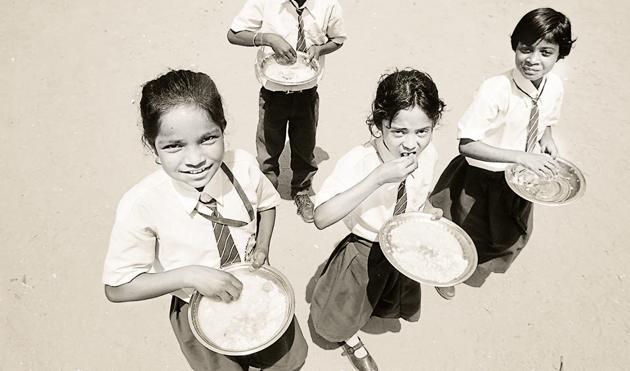Midday meal scheme has worked: Keep politics out
The State must make the scheme even more attractive by incorporating food that is to children’s taste
The midday meal controversy in Uttar Pradesh where a journalist alleged that children were being given substandard meals, and its fall out, whatever the merits or demerits of the case, is one in a long list of controversies which have plagued the scheme since it was universalised in 2001. Tamil Nadu was the one state which had the foresight to have started the scheme earlier with positive results for enrolment and retention in schools.

Some years ago, I visited a midday meal kitchen run by the NGO Naandi Foundation in Hyderabad, one of many it ran at that time. The food was steamed cooked in large steel vats, eliminating the need for oil; small additions like fresh soy milk and pickles were included to the menu after the NGO found that the children liked the taste of these. Most of all, the scheme was flexible enough to allow the children to take home bits of leftover food for their younger siblings. Local women were engaged to prepare the raw material for the meals and clean the kitchens. The NGO ensured that the meals were not monotonous, and incorporated different vegetables and dals every day. On the odd occasions, a dessert would be added to the meal. The retention rate in schools which availed of the scheme was spectacular.
The midday meal is perhaps the single biggest achievement in the school system in India. Apart from increasing enrolment and retention, it has brought down hunger, and promoted health and cognitive abilities in children. There is simply nothing that anyone can find that is wrong with it, if you leave out the politics.
But as with all good schemes, several extraneous considerations come into play. In some states, ostensibly due to religious reasons, eggs were done away with, although this is a vital nutritional addition to the midday meal scheme. Several experts believe that the addition of milk and eggs in the meal is invaluable in a country where many children suffer from stunting as a result of poor nutrition in childhood. But the arguments against eggs and milk have included these food items being difficult to transport — in the case of eggs, it being easily breakable, and in the case of milk, it being prone to spoiling and contamination. It is passing strange that state governments which run the schemes are unwilling to take the responsibility of preventing such spoiling, breakage and contamination. The other foolish argument is that serving eggs would make vegetarian children uncomfortable.
Also read: Salt-roti midday meal: Yogi government to examine FIR against journalist
The answer should be simple: they should be given an alternative, but surely no one has a right to object to a food item that some children may wish to eat. A popular NGO which serves midday meals across the country refuses to serve food which includes onions and garlic on religious grounds. It also refuses to include eggs on the menu. But, surely the primary concern must be that the meal served should be tasty and nutritious for the child and not the religious beliefs of the provider. It is here that the state governments should step in and insist that the providers should keep their beliefs aside, and do what is best for the child.
Also read: 260 self-help groups barred from supplying midday meal in Mumbai municipal schools
Other counterproductive tinkering with the system is the proposal to provide the child with uncooked grains and lentils to take home. This cannot guarantee that the child will actually get the food, especially the girl child whose nutritional needs are often overlooked in a patriarchal society. A former minister for women and child development argued long and hard for packaged food on the grounds that it was more hygienic and less prone to any form of contamination. Now, that may well be so, but a hot meal is what a growing child needs, and that too something to suit his or her taste. The success of Tamil Nadu has not been in just implementing the midday meal scheme across the state but in providing food that the child is familiar with.
In the case of the Hyderabad NGO I visited, some children had actually started bringing their smaller siblings to the school premises, where they would play in the grounds until the meal was served and get a small portion of the leftover food. This served two purposes: it provided some nutrition to the child who was not yet in school and created a favourable environment for enrolment at home, and it freed up the school-going child from having to stay home to help care for the smaller child.
This is one scheme which successive governments ought to be proud of. The endeavour now should be to work to make it even more attractive by incorporating food that children relate to, and ensuring that when it comes to the health and educational progress of children, politics does not become the spoiler.
lalita.panicker@hindustantimes.com






